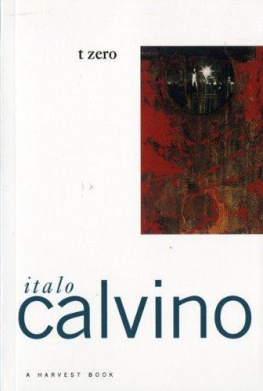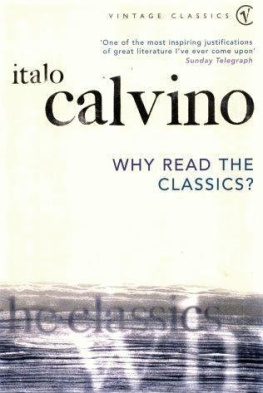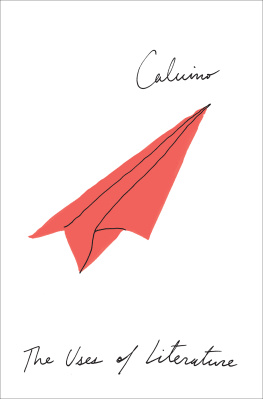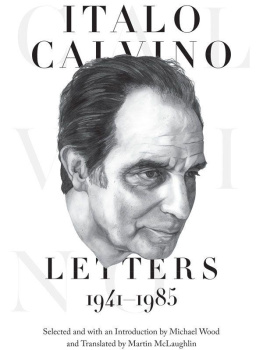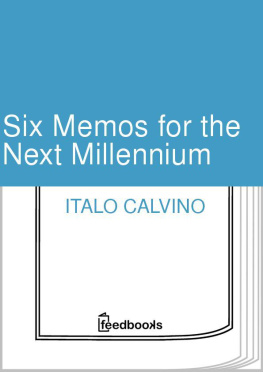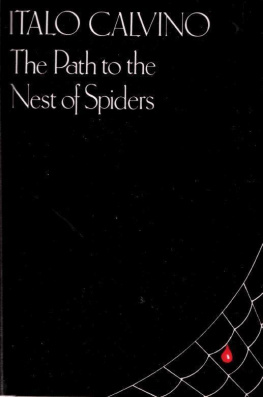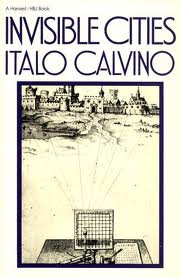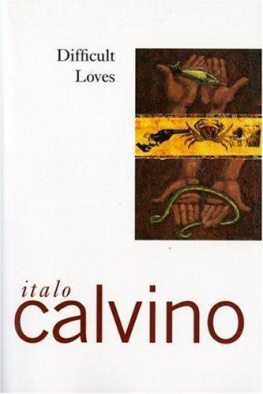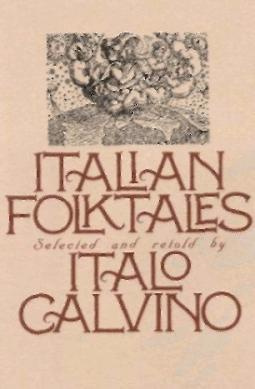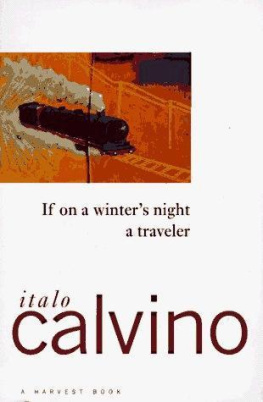Italo Calvino - t zero (A Harvest HBJ BookH)
Here you can read online Italo Calvino - t zero (A Harvest HBJ BookH) full text of the book (entire story) in english for free. Download pdf and epub, get meaning, cover and reviews about this ebook. year: 1976, publisher: Harcourt Brace Jovanovich, genre: Science fiction. Description of the work, (preface) as well as reviews are available. Best literature library LitArk.com created for fans of good reading and offers a wide selection of genres:
Romance novel
Science fiction
Adventure
Detective
Science
History
Home and family
Prose
Art
Politics
Computer
Non-fiction
Religion
Business
Children
Humor
Choose a favorite category and find really read worthwhile books. Enjoy immersion in the world of imagination, feel the emotions of the characters or learn something new for yourself, make an fascinating discovery.
- Book:t zero (A Harvest HBJ BookH)
- Author:
- Publisher:Harcourt Brace Jovanovich
- Genre:
- Year:1976
- Rating:5 / 5
- Favourites:Add to favourites
- Your mark:
- 100
- 1
- 2
- 3
- 4
- 5
t zero (A Harvest HBJ BookH): summary, description and annotation
We offer to read an annotation, description, summary or preface (depends on what the author of the book "t zero (A Harvest HBJ BookH)" wrote himself). If you haven't found the necessary information about the book — write in the comments, we will try to find it.
t zero (A Harvest HBJ BookH) — read online for free the complete book (whole text) full work
Below is the text of the book, divided by pages. System saving the place of the last page read, allows you to conveniently read the book "t zero (A Harvest HBJ BookH)" online for free, without having to search again every time where you left off. Put a bookmark, and you can go to the page where you finished reading at any time.
Font size:
Interval:
Bookmark:
Italo Calvino
T Zero
Translated from the Italian by William Weaver
Copyright 1967
English translation copyright 1969
Contents
PART ONE
More of Qfwfq
The Soft Moon 3
The Origin of the Birds
Crystals
Blood, Sea 39
PART TWO
Priscilla
I. Mitosis 59
II. Meiosis 75
III. Death
PART THREE
t zero
t zero
The Chase
The Night Driver 128
The Count of Monte Cristo 137
Part One
More of Qfwfq
The Soft Moon
According to the calculations of H. Gerstenkorn, later developed by H. Alfven, the terrestrial continents are simply fragments of the Moon which fell upon our planet. According to this theory, the Moon originally was a planet gravitating around the Sun, until the moment when the nearness of the Earth caused it to be derailed from its orbit. Captured by terrestrial gravity, the Moon moved closer and closer, contracting its orbit around us. At a certain moment the reciprocal attraction began to alter the surface of the two celestial bodies,
raising very high waves from which fragments were detached and sent spinning in space, between Earth and Moon, especially fragments of lunar matter which finally fell upon Earth. Later, through the influence of our tides, the Moon was impelled to move away again, until it reached its present orbit. But a part of the lunar mass, perhaps half of it, had remained on Earth, forming the continents.
She was coming closer, Qfwfq recalled, I noticed it as I was going home, raising my eyes between the walls of glass and steel, and I saw her, no longer a light like all the others that shine in the evening: the ones they light on Earth when at a certain hour they pull down a lever at the power station, or those of the sky, farther away but similar, or at least not out of harmony with the style of all the restI speak in the present tense, but I am still referring to those remote timesI saw her breaking away from all the other lights of the sky and the streets, standing out in the concave map of darkness, no longer occupying a point, perhaps a big one on the order of Mars and Venus, like a hole through which the light spreads, but now becoming an out-and-out portion of space, and she was taking form, not yet clearly identifiable because eyes weren't used to identifying it, but also because the outlines weren't sufficiently precise to define a regular figure. Anyway I saw it was becoming a thing.
And it revolted me. Because it was a thing that, though you couldn't understand what it was made of, or perhaps precisely because you couldn't understand,
seemed different from all the things in our life, our good things of plastic, of nylon, of chrome-plated steel, duco, synthetic resins, plexiglass, aluminum, vinyl, formica, zinc, asphalt, asbestos, cement, the old things among which we were born and bred. It was something incompatible, extraneous. I saw it approaching as if it were going to slip between the skyscrapers of Madison Avenue (I'm talking about the avenue we had then, beyond comparison with the Madison of today), in that corridor of night sky glowing with light from above the jagged line of the cornices; and it spread out, imposing on our familiar landscape not only its light of an unsuitable color, but also its volume, its weight, its incongruous substantiality. And then, all over the face of the Earththe surfaces of metal plating, iron armatures, rubber pavements, glass domesover every part of us that was exposed, I felt a shudder pass.
As fast as the traffic allowed, I went through the tunnel, drove toward the Observatory. Sibyl was there, her eye glued to the telescope. As a rule she didn't like me to visit her during working hours, and the moment she saw me she would make a vexed face; but not that evening: she didn't even look up, it was obvious she was expecting my visit. "Have you seen it?" would have been a stupid question, but I had to bite my tongue to keep from asking it, I was so impatient to know what she thought about it all.
"Yes, the planet Moon has come still closer," Sibyl said, before I had asked her anything, "the phenomenon was foreseen."
I felt a bit relieved. "Do you foresee that it'll move away again?" I asked.
Sibyl still had one eyelid half closed, peering into the telescope. "No," she said, "it won't move away any more."
I didn't understand. "You mean that the Earth and the Moon have become twin planets?"
"I mean the Moon isn't a planet any more and the Earth has a Moon."
Sibyl had a casual way of dismissing matters; it irritated me every time she did it. "What kind of thinking is that?" I complained. "One planet's just as much a planet as the others, isn't it?"
"Would you call this a planet? I mean, a planet the way the Earth's a planet? Look!" And Sibyl moved from the telescope, motioning me to approach it. "The Moon could never manage to become a planet like ours."
I wasn't listening to her explanation: the Moon, enlarged by the telescope, appeared to me in all its details, or rather many of its details appeared to me at once, so mixed up that the more I observed it the less sure I was of how it was made, and I could only vouch for the effect this sight caused in me, an effect of fascinated disgust. First of all, I could note the green veins that ran over it, thicker in certain zones, like a network, but to tell the truth this was the most insignificant detail, the least showy, because what you might call the general properties eluded the grasp of my glance, thanks perhaps to the slightly viscous glistening that transpired from a myriad of pores, one would have said, or opercula, and also in certain points from extended tumefactions of the surface, like buboes or suckers. There, I'm concentrating again on the details, a more picturesque method of description apparently, though in reality of
only limited efficiency, because only by considering the details within the wholesuch as the swelling of the sublunar pulp which stretched its pale external tissues but made them also fold over on themselves in inlets or recesses looking like scars (so it, this Moon, might also have been made of pieces pressed together and stuck on carelessly)it is, as I say, only by considering the whole, as in diseased viscera, that the single details can also be considered: for example, a thick forest as of black fur which jutted out of a rift.
"Does it seem right to you that it should go on revolving around the Sun, like us?" Sibyl said. "The Earth is far stronger: in the end it'll shift the Moon from its orbit and make it turn around the Earth. We'll have a satellite."
I was quite careful not to express the anguish I was feeling. I knew how Sibyl reacted in these cases: assuming an attitude of blatant superiority, if not of downright cynicism, acting like a person who is never surprised by anything. She behaved this way to provoke me, I believe (that is, I hope; I would certainly have felt even greater anguish at the thought that she acted out of real indifference).
"And... and..." I started to say, taking care to formulate a question that would show nothing but objective curiosity and yet would force Sibyl to say something to appease my anxiety (so I still hoped for this from her, I still insisted that her calm reassure me), "... and will we always have it in sight like this?"
"This is nothing," she answered. "It'll come even closer." And for the first time, she smiled. "Don't you like it? Why, seeing it there like that, so different, so far
from any known form, and knowing that it's ours, that the Earth has captured it and is keeping it there ... I don't know, I like it, it seems beautiful to me."
At this point I no longer cared about hiding my mood. "But won't it be dangerous for us?" I asked.
Sibyl tensed her lips in the expression of hers I liked least. "We are on the Earth, the Earth has a force which means it can keep planets around itself, on its own, like the Sun. What can the Moon oppose, in the way of mass, field of gravity, orbit stability, consistency? Surely you don't mean to compare the two? The Moon is all soft, the Earth is hard, solid, the Earth endures." "What about the Moon? If it doesn't endure?" "Oh, the Earth's force will keep it in its place." I waited till Sibyl had finished her shift at the Observatory, to drive her home. Just outside the city there is that cloverleaf where all the superhighways spread out, rushing over bridges that cross one another in spiral patterns, held up by cement pillars of different heights; you never know in what direction you're going as you follow the white arrows painted on the asphalt, and now and then you find the city you're leaving suddenly facing you, coming closer, patterned with squares of light among the pillars and the curves of the spiral. There was the Moon just above us: and the city seemed fragile to me, suspended like a cobweb, with all its little tinkling panes, its threadlike embroidery of light, under that excrescence that swelled the sky.
Next pageFont size:
Interval:
Bookmark:
Similar books «t zero (A Harvest HBJ BookH)»
Look at similar books to t zero (A Harvest HBJ BookH). We have selected literature similar in name and meaning in the hope of providing readers with more options to find new, interesting, not yet read works.
Discussion, reviews of the book t zero (A Harvest HBJ BookH) and just readers' own opinions. Leave your comments, write what you think about the work, its meaning or the main characters. Specify what exactly you liked and what you didn't like, and why you think so.

